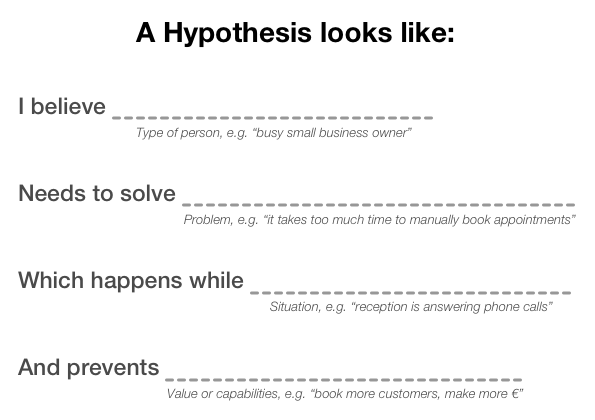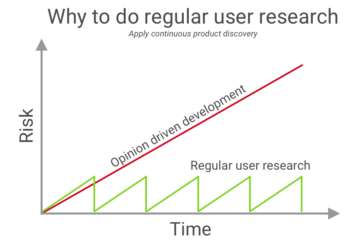Why conducting interviews?
People usually do not know exactly what they want therefore you need to observe what they do and listen their frustration.
Understanding of your customers’ frustration and needs are the main reasons why you should talk to your customers and conduct a proper customer interview.
What you can learn from interviews
Current behaviors: what people are doing today and why; when (alone, with friends, during meeting…); alternative tools.
Frustrations: you can have all the data from analytical tools, but without deeper knowledge of your customers, you will never know their feelings, emotions…
Constraints: what do people prevent from doing something (e.g. budget constraints); social constraints – I love Snapchat but nobody uses anymore; I love Dropbox but I can’t use it in a work… – what stands between customer and your product.
Decision-making factors: e.g. Costumer has money but no time, Does this solution save me time?; Does this solution make me cooler? Note that these factors are not stable – people more likely spend $10 for a book on phone when they are bored and standing in a queue than in the book store when they are not bored.
Start with hypothesis
Write down all relevant hypotheses, each hypothesis should follow similar format:
I believe: person based on behavior
Needs to solve: problem
Situation: when the problem is happening
Prevents: what is making customer life harder

Remember to always include problem, solution and benefit.
ℹ︎ Practical tip: Different group of people (such as stakeholders) often have different hypothesis. Try to align them and unite their hypotheses.
Avoid cognitive biases (brain’s shortcuts)
Each human being has the tendency to present themselves in a certain way. At the beginning, we need to do proper warm-up and introduction to let participants loosen-up a bit, so that they are not afraid of openly talking with us.
Confirmation bias
- When we believe that something is true we are looking for confirmation that prove it.
- The tendency to search for, interpret, focus on and remember information in a way that confirms one’s preconceptions.
Choice supportive bias
- Once we did the choice we believe it was good choice.
- The tendency to remember one’s choices as better than they actually were.
Social desirability bias
- We give answers which will make as seem better.
- The tendency to over-report socially desirable characteristics or behaviors in oneself and under-report socially undesirable characteristics or behaviors.
- Have you ever cheated on you taxes? What will you answer?
Projection bias
- We project in the future our very optimistic selves – Yes, I’d buy that, I’d change my behavior
- The tendency to overestimate how much our future selves share one’s current preferences, thoughts and values, thus leading to sub-optimal choices
How to ask effectively
Approach interview in a way that it is not about answering questions but rather about the whole conversation – sharing experiences, stories, frustrations and opinions.
Abstract up a level
Do not ask the specific question what you need to know (e.g. which tool do you use). You should ask more broadly (e.g. what helps you get your job done?) Then you will get unfiltered answers.
Open-ended questions
Start questions with: Tell me about …… This is a form of invitation to tell you a story. Then people include the important things what frustrate them or what makes them happy.
Example of a good questions is: Q: Tell me how how you get to work? This way, you will get more complex information.
Wrong example is: Q: How long does your commute take? A: 40 minutes – How do you know that those 40 minutes are good or bad?
Ask about past, not future
Last experiences are far more accurate. When we talk about the future, we are predicting, this leads to the Projection bias.
Q: How often do you go to gym? A: 5x week… Even though this is not true, the interviewee wants to believe in it. He/she wants to go to gym 5x a week. The interviewees don’t want to destroy your research, they want to be person who goes 5x week to gym.
The best predictor of future behavior is past behavior.
Avoid yes/no questions
Ask for stories. One word answers can be misleading, influenced by biases and won’t give you enough information
Avoid leading questions
You shouldn’t ask question such as: Wouldn’t you like it if…? or Is it true that…? Participants tend to agree with you because they are polite not because they truly believe it
Example of a good questions is: Q: Tell me what you know about… With this type of question you can get more information from participants and see what is their experience with a specific topic.
Step outside your perspective
Instead of asking Q: What can be improve about some work tool? ask Q: What advice would participant give to a new colleague?
Sometimes participants are used to do some interesting workarounds and they might forgot about them. By changing their mindset we can get more relevant information.
Examples of good interview questions:
Start with questions like:
“Tell me how you do [subject] today…”
“Last time you did [subject] , what did you do to prepare? Afterwards to wrap up?”
“If you had a new [coworker/friend/peer] who was learning how to do [subject], what advice would you give them?”
“If you could wave a magic wand and change anything -doesn’t have to be possible – about doing [subject], what would it be?”
Follow up on pain points:
“In the past month, how often has [problem] happened?”
“What other ways have you tried to solve [problem]?”
“If [problem] was magically solved, how would that make your life better? What would you be able to do?”
“How high a priority is it to fix [problem]?”
“Who else is affected when [problem] happens?”
Ending on a good note:
We’re coming up on the end of time, and I don’t want to keep you longer.
Thank you — this has been really useful.
Is there anyone else you’d recommend I talk to?
If we proceed, can I contact you again?
Do you have any questions for me?
Thank you again!
How to invite a respondent to an interview?
- Make it short – an invitation will probably be read on phone
- Personalize it – ego boost, you are special and only you can provide extremely valuable informations
- Explain precisely why with you and what is the one thing what you need to know or learn
- Be friendly – sound human, not too formal
ℹ︎ Practical tip: If you need a longer time than 20 minutes and time is the interviewee’s concern, then do only the short interview and at the end ask for more time.
Example of Interview invitation letter
Hi [Interviewee’s name],
I am trying to learn more about [subject] and would like to hear more about your experiences because [interviewee’s qualifications].
Could you help me out by joining me to a 20-minute call?
[Call to Action button – one-click option for agreeing and scheduling]
Thank you so much!
[Just your name, omit company or “expertise” status]


